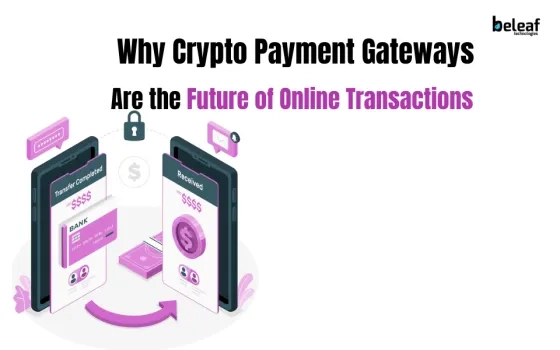The rise of cryptocurrency has marked a significant shift in how we think about money. Crypto payment gateways are leading this change, and their impact on online transactions is undeniable. As we move toward a more decentralized, secure, and global economy, it’s clear that crypto payment gateways are poised to play a central role in the future of online commerce.
But what exactly is a crypto payment gateway, and why are they becoming such an important part of the financial ecosystem? Let’s take a closer look.
What Are Crypto Payment Gateways?
A crypto payment gateway functions similarly to a traditional payment gateway, but instead of processing credit or debit card payments, it facilitates cryptocurrency transactions. This technology allows businesses to accept payments in digital currencies such as Bitcoin, Ethereum, and other altcoins. The process is often seamless for both businesses and consumers, with crypto payment gateways converting cryptocurrencies into the local currency of the merchant if needed.
These gateways make it easier for businesses to integrate cryptocurrency as a payment method, allowing them to tap into a growing market of crypto users. The technology behind crypto payment gateways also provides security, speed, and cost-efficiency, making them a viable alternative to traditional payment systems.
Key Advantages of Crypto Payment Gateways
- Lower Transaction Fees
One of the primary reasons why businesses are adopting crypto payment gateways is the lower transaction fees compared to traditional payment processors. Credit card companies and banks often charge significant fees (sometimes up to 3% or more) for every transaction. These costs can quickly add up, especially for small businesses or online merchants processing many transactions.
In contrast, crypto payment gateways typically have much lower fees, with some platforms offering fees as low as 0.5%. This can lead to substantial savings, especially for companies handling a high volume of transactions.
- Security and Fraud Prevention
Security is one of the most important considerations for businesses and consumers in the digital age. Crypto payment gateways leverage blockchain technology, which is inherently secure due to its decentralized and immutable nature. Transactions on the blockchain are encrypted and recorded in a public ledger, making it nearly impossible for fraudsters to alter transaction data or commit chargeback fraud.
Moreover, since crypto payments are typically irreversible, merchants don’t need to worry about chargebacks, a common problem with credit card payments. This reduces the risk of losing revenue to fraudulent claims, making crypto payments a safer option for businesses.
- Global Accessibility
Another standout feature of crypto payment gateways is their ability to facilitate global transactions. Cryptocurrencies are not tied to any single country or currency, which means they can be used for international payments without the need for currency conversion or hefty fees from banks and intermediaries. Whether you're a small business in India or a large enterprise in the United States, you can easily accept payments from customers across the globe.
This worldwide reach is especially advantageous for e-commerce businesses aiming to grow their customer base. By integrating a crypto payment gateway, companies can attract customers from all over the world, without the complexities of dealing with multiple currencies and banking systems.
- Faster Transactions
Traditional payment systems, especially for international transfers, can take several days to process due to the involvement of multiple intermediaries, including banks, payment processors, and clearing houses. On the other hand, cryptocurrency transactions are completed at a much quicker pace. Depending on the cryptocurrency and network conditions, payments can be completed in minutes or even seconds.
This speed is particularly useful for businesses that deal with time-sensitive transactions, such as online retailers or service providers. Crypto payment gateways enable instantaneous transactions, allowing businesses to serve their customers faster and more efficiently.
- Enhanced Privacy
Crypto payments offer a higher level of privacy compared to traditional methods. When customers pay with cryptocurrencies, their personal information is not required, unlike credit card payments, which demand sensitive data like names, addresses, and card numbers. This ensures that customers have more control over their financial data, which can help reduce the risks associated with data breaches and identity theft.
For businesses, offering privacy-focused payment options can be an attractive feature for customers who value discretion and security.
How Crypto Payment Gateways Drive Innovation
- Decentralization
One of the core principles of cryptocurrency is decentralization – the idea that financial transactions can occur without the need for a central authority, such as a bank. Crypto payment gateways align perfectly with this philosophy, allowing businesses and consumers to transact directly with one another without intermediaries. This model eliminates the need for middlemen, which means lower costs and greater control over financial transactions.
By embracing decentralized payment systems, crypto payment gateways help businesses operate in a more independent and cost-effective manner, contributing to the rise of decentralized finance (DeFi).
- Blockchain Integration
Blockchain technology, the backbone of cryptocurrencies, is helping businesses streamline their operations beyond just payment processing. For example, blockchain can be used for inventory management, smart contracts, and supply chain tracking. This innovation is making businesses more efficient and transparent.
Many crypto payment gateways integrate with blockchain solutions, allowing companies to benefit from not only the payments themselves but also the broader capabilities of blockchain technology. This integration leads to the creation of new opportunities for businesses to innovate in their operations.
- Opening New Market Segments
As the number of cryptocurrency users continues to rise, businesses are increasingly targeting this new market segment. By accepting cryptocurrency payments, businesses can cater to the needs of crypto enthusiasts, investors, and traders who prefer using digital currencies over traditional methods. This opens up new revenue streams and market opportunities for companies willing to adopt crypto payment gateways.
Additionally, crypto payments can appeal to customers in regions with less access to traditional banking infrastructure, giving businesses the opportunity to expand into underserved markets.
The Future of Crypto Payment Gateways
The adoption of crypto payment gateways is likely to increase as more consumers and businesses recognize the advantages of digital currencies. As cryptocurrencies continue to gain acceptance, we can expect several trends to shape the future of crypto payments:
- More Integration with Traditional Systems
As the technology matures, we are likely to see more integration between crypto payment gateways and traditional banking systems. This will enable businesses to seamlessly switch between fiat and crypto payments, making it easier to manage funds and reduce the complexity of handling multiple currencies.
- Improved User Experience
To drive widespread adoption, crypto payment gateways must continue to improve the user experience. Streamlined interfaces, enhanced security, and better customer support are key areas that need attention. As user experience improves, more consumers and merchants will be willing to embrace crypto payments.
- Regulatory Clarity
Regulatory uncertainty has been one of the biggest obstacles to the widespread adoption of cryptocurrencies. However, as governments around the world begin to clarify their positions on crypto, businesses will feel more confident in accepting cryptocurrencies. Regulatory clarity will provide a more stable environment for businesses to adopt crypto payment gateways.
- Stablecoins as a Payment Method
Stablecoins, cryptocurrencies pegged to a stable asset like the U.S. dollar, are likely to gain more prominence in crypto payment gateways. Because stablecoins are less volatile than traditional cryptocurrencies like Bitcoin or Ethereum, they can provide the benefits of cryptocurrency without the associated price fluctuations.
Conclusion
Crypto payment gateways are revolutionizing the world of online transactions, offering businesses and consumers a more secure, cost-effective, and efficient way to handle payments. With their lower transaction fees, enhanced security, global accessibility, and speed, these gateways are not just a passing trend—they’re a glimpse into the future of finance.
As cryptocurrency adoption continues to grow and the technology behind crypto payment gateways improves, these systems will become an integral part of the global economy. Businesses that embrace this change will be well-positioned to thrive in the future of online commerce.














